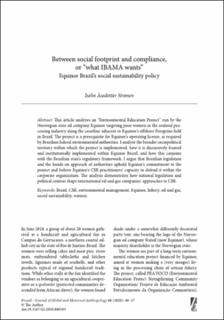Between social footprint and compliance, or “what IBAMA wants” Equinor Brazil's social sustainability policy
Journal article, Peer reviewed
Published version

Åpne
Permanent lenke
https://hdl.handle.net/11250/2753333Utgivelsesdato
2020Metadata
Vis full innførselSamlinger
Originalversjon
Focaal: Journal of Global and Historical Anthropology. 2020, 88: 40–57 10.3167/fcl.2020.880103Sammendrag
This article analyzes an “Environmental Education Project” run by the Norwegian state oil company Equinor targeting poor women in the seafood processing industry along the coastline adjacent to Equinor's offshore Peregrino field in Brazil. The project is a prerequisite for Equinor's operating license, as required by Brazilian federal environmental authorities. I analyze the broader sociopolitical territory within which the project is implemented, how it is discursively framed and institutionally implemented within Equinor Brazil, and how this conjoins with the Brazilian state's regulatory framework. I argue that Brazilian legislation and the hands-on approach of authorities uphold Equinor's commitment to the project and bolster Equinor's CSR practitioners’ capacity to defend it within the corporate organization. The analysis demonstrates how national legislation and political context shape international oil and gas companies’ approaches to CSR.
